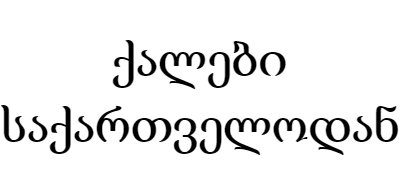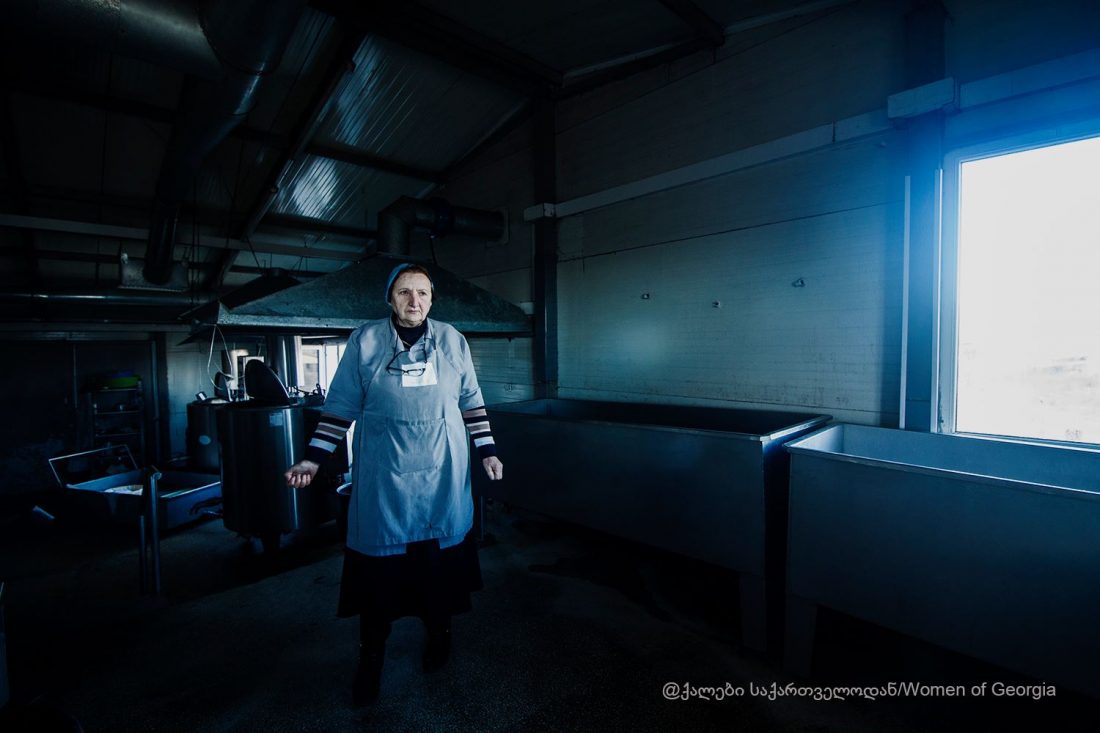Meri Makharadze,68 years old, Bolnisi (village Disveli)
”We’ve been relocated here after the landslide in the 90s. An avalanche covered the village Tsablani and a part of its population along with their homes and livelihood. This tragedy killed 28 people. It was decided to move us to Bolnisi, to the Disveli village. Here, a new village for 230 people would have to be built, with its infrastructure and everything. needed environment.
There was a chicken farm here before and until the village was being built, some of the villagers were accommodated in the dorm – and even that with the help of locals. Construction went on for 2-3 years, but meanwhile, the Soviet Union collapsed, everything stopped and the village was never built. Anyways, we had to leave Adjara, as geologists concluded that our village was not suited for living. People who came here started producing goods and decided to finish building the village. None of the houses were finished – a part of them wasn’t roofed, and the rest totally unfurnished. People started living there in such conditions and continued building their homes on their own. We were luckier since we had eight children and because of that, we were given a large house in Bolnisi’s center.
We have been through hard days — there were long lines for bread and, to add insult to injury, it was baked with flour of such a terrible quality that somehow the bread looked green. Even dogs wouldn’t eat it. My mother-in-law cried frequently – how could she feed this to children – and she baked cornbread instead. It turned out that the families had only themselves to rely on. Some people went back, but there are no living conditions, no pastures and even the corn harvest is dismal. There’s an even worse situation – here we at least have some pastures.
 I’m an economist by education. I don’t know how I managed, but even though I had 8 children, I was always working. I gave birth to my last child when we were already moved to Bolnisi. Our whole family worked and studied at the same time and life went on. Nowadays none of our children live with us – some are in Tbilisi, some in Batumi and some are no longer in Georgia.
I’m an economist by education. I don’t know how I managed, but even though I had 8 children, I was always working. I gave birth to my last child when we were already moved to Bolnisi. Our whole family worked and studied at the same time and life went on. Nowadays none of our children live with us – some are in Tbilisi, some in Batumi and some are no longer in Georgia.
Our situation somehow improved after some donors got interested in the lives of eco-migrants. For example, in 2014 we united with 5 families to form a cooperative. Because of the Soviet Union experience, there’s some mistrust in cooperatives. In fact, the cooperative receives a lot of tax benefits from the government – we don’t pay the personal or corporate income taxes. However, these benefits are temporary and will last until 2020. If the taxes overwhelm us, our situation will get more complicated and in general, those taxes could kill the idea at birth. We work this way – if we have to make a decision regarding the cooperative, we all meet, discuss it and make the final decision together.
We, as a cooperative, bought this building that was old and in ruins. In the same period, within the framework of an EU-backed project, we got our plans for a dairy factory financed – producing milk more profitable to us as a breeding community. With the help of this project, we added a second floor, bought sterilizers, various installations and other equipment for the enterprise. People here have always bred cattle, but selling the product was an issue. People had to take dairy every Sunday to the market for selling, but sales weren’t guaranteed and they struggled a lot. We improved this situation because we take goods from them and then manage distribution as needed.
We can’t say this cooperative made us rich – we still have to handle a lot of problems or turn a good profit, but we’re employed and get paid. In addition, we are shareholders and in case of a profit, we divide it equally. Everyone interested in natural dairy products is our customer. At this point, we’re regularly distributing our products to some supermarkets and restaurants. The product is called ”Disveli” and our niche is quality. However, our main problem is that we can’t compete on price with products made from powder. Therefore, sales remain the most difficult stage of our operation.
 Various organizations have also helped us, like CENN and we participated in many training courses. We knew how to handle cattle and milk before, but we had to actually integrate new systems. What’s done in the family in a small pot, can’t be replicated in 700-800 liter pasteurizers. We learned the knowledge and skills of market product development from these training and from visiting other enterprises that shared their experiences. We really internalized everything we learned and we even introduced a self-managed quality control program. We’re in constantly developing ourselves. We’re looking for different opportunities to make our enterprise more profitable to improve own families finances and to be able to better help our village. When we’ll have enough income, we want to take care of the village gardens, roads and support programs for the students. This is also cemented in our corporate guidelines that we’ll spend 5% of the profits in rural development projects. It’s important to feel that we are a collective and we know we’re doing a good job for somebody else.
Various organizations have also helped us, like CENN and we participated in many training courses. We knew how to handle cattle and milk before, but we had to actually integrate new systems. What’s done in the family in a small pot, can’t be replicated in 700-800 liter pasteurizers. We learned the knowledge and skills of market product development from these training and from visiting other enterprises that shared their experiences. We really internalized everything we learned and we even introduced a self-managed quality control program. We’re in constantly developing ourselves. We’re looking for different opportunities to make our enterprise more profitable to improve own families finances and to be able to better help our village. When we’ll have enough income, we want to take care of the village gardens, roads and support programs for the students. This is also cemented in our corporate guidelines that we’ll spend 5% of the profits in rural development projects. It’s important to feel that we are a collective and we know we’re doing a good job for somebody else.
Until that we’re battling many problems. Since the building is two-storied, it is uncomfortable to constantly bring the products up and down. So, we want to add a new hall for easier production. We got credit from the bank, but obviously, we still need some support from donors. For example, we want to have solar panels for warming the water, since our electricity bill is too high and it’s a heavy burden for such a small enterprise. We really need support in such things. If any organizations would want to offer support, it will be a great help for our development. We hope that in the future investors will also be interested to invest money, then we’ll be able to expand our enterprise and the cooperative will begin to turn a profit.
Now we’re going through the hard stage of labeling. We want the labels to show that this is a natural Georgian dairy product. For this, we need various expensive lab studies, but without them, we can’t bring our product to market.
By the way, we have a very busy schedule and since the project was started by women – to be exact, five women and one man – it’s women who work the most. We start at 11 AM and finish when the products are sent, which is about 2-3 AM. Therefore, we have a schedule and every four days one girl has a day off. Besides working here, women have their own household chores to take care of, and some don’t really have substitutes there. We don’t really get any time to rest.
Author: Ida Bakhturidze
Photographer: Salome Tsopurashvili
Translation: Mariam Kajrishvili

